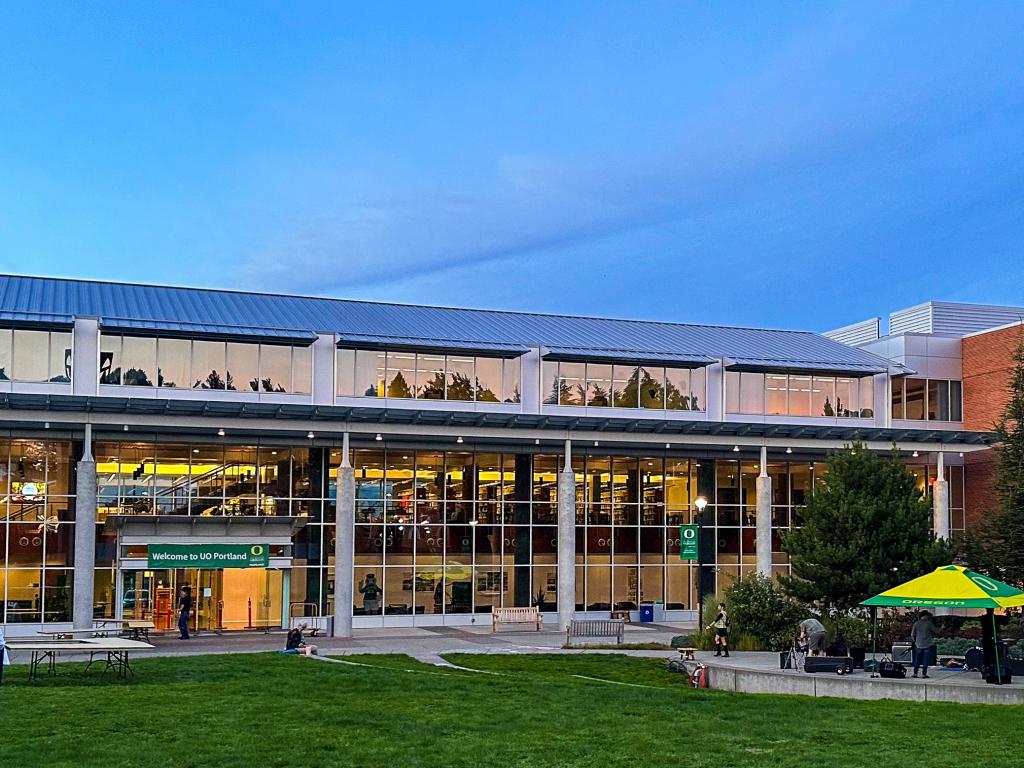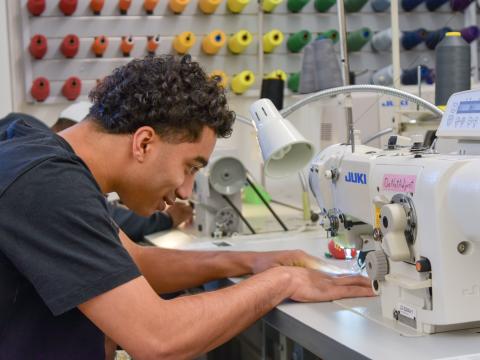
When the University of Oregon, with a generous gift from Steve and Connie Ballmer, purchased its new campus in Portland, it was with the knowledge that the new location would enable ongoing research to expand and new research opportunities to flourish.

The past year has seen a flurry of activity preparing the campus for researchers, staff, students, and community members. Buildings have been remodeled with new research and teaching uses in mind, including design labs, a biometric scanning room, and improved collaboration spaces.
“The labs and maker spaces at the new campus underscore the important research, innovation, and community impact UO Portland academic programs have been leading for years,” said Jane Gordon, vice president for Portland. “The campus was renovated with interdisciplinary innovation in mind, and we are already seeing faculty and students exploring collaborations.”
UO Portland is host to seven research centers.
The Agora Journalism Center, housed in the School of Journalism and Communication, is the forum for the future of local news and civic health.
“As we move forward, the Agora Journalism Center remains committed to supporting the health of Oregon's local news ecosystem,” said Andrew DeVigal, the center’s director and endowed chair in journalism innovation and civic engagement. “This year, we will update our 2022 report to reflect the evolving landscape of local news and information in Oregon. By closely examining these changes, we aim to address the growing information gaps faced by communities across the state. Our research continues to focus on advocating for stronger, more sustainable local journalism that ensures all Oregonians have access to the information they need to stay connected and engaged.”
Another center is Urbanism Next, which investigates the secondary impacts of new technology on city development, form and design and what that means for sustainability, resiliency, equity, cost, and general livability.
“Having a full campus allows all our programs eventual room for expansion and creates more spaces and opportunities for cross disciplinary work,” said Nico Larco, the center’s director and professor of architecture and urban design. “The excitement on campus is palpable. The Urbanism Next Center and the Sustainable Cities Initiative are excited to be working in our new neighborhood as we continue to engage with the broader Portland region.”
Prevention Science Institute-Portland (PSI): This institute focuses on understanding and promoting mental health and resilience in individuals, children, and families, with particular emphasis on the dissemination of effective interventions to real-world settings.
For PSI researchers, the relocation to the new campus will enable them to continue ongoing research with children and families about COVID-19-related learning disruptions, evidence-based behavioral interventions in schools, and evaluating new interventions for preschool-aged children with autism spectrum disorder.

“During the past 30 years, PSI has conducted research in the Portland metro area out of several offices in various parts of town, including the last 12 years in the White Stag building in the Old Town neighborhood,” said Allison Caruthers, senior research associate II and project director for PSI-Portland. “We are thrilled to now be located on the new Portland campus and to welcome children and families to new spaces where we can continue our work together.”
Other UO research centers located in Portland include:
- Energy Studies in Building Laboratory: The lab focuses on improving global health and sustainability by improving traditional design practices.
- Institute for Health in the Built Environment: This center focuses on creating and proposing solutions to issues of climate change, affordable housing, health, and energy through a systematic approach.
- Labor Education and Research Center: This state-wide program combines teaching, research, and public services to improve the lives of Oregon workers. Research initiatives are related to employment, economic equity, diversity and inclusion, and public policy.
- Oregon Reality Lab: A multidisciplinary teaching and research facility dedicated to cultivating immersive media as an ethical tool for communication innovation.
In addition to improvements made to existing structures, the UO will break ground on the new Child Behavioral Health Building meant to house the Ballmer Institute for Children’s Behavioral Health and Prevention Science Institute in 2025, with completion slated for 2028.
